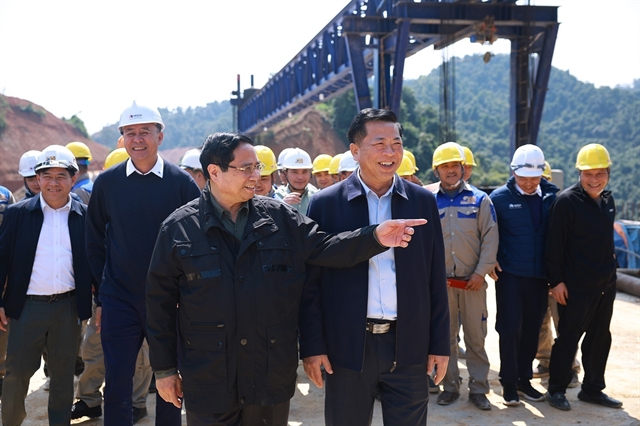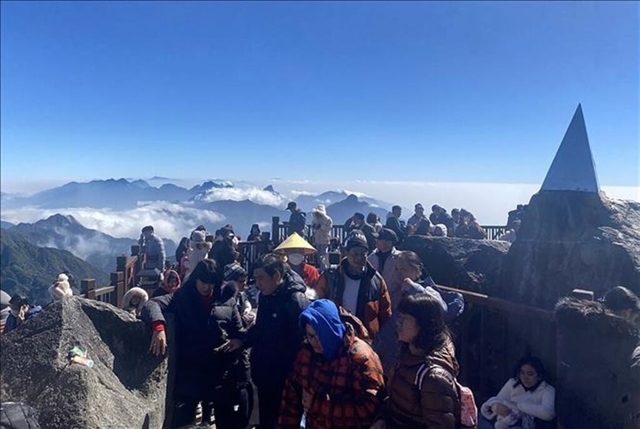 Society
Society


|
| Specimens that were taken from quarantined people after coming into close contact with confirmed COVID-19 cases being processed at Thanh Nhàn Hospital, one of the 13 designated COVID-19 testing facilities in Hà Nội. — VNA/VNS Photo Minh Quyết |
HÀ NỘI — Health experts agreed that Việt Nam needs a new COVID-19 testing strategy that can effectively and swiftly detect virus carriers, in order to keep socio-economic activities going.
Professor Đặng Đức Anh, Director of the National Institute of Hygiene and Epidemiology, said at Thursday's meeting of the National Steering Committee on COVID-19 Prevention and Control, that the country needs to develop a system of antigen testing at places like airports, border gates, and centralised quarantine facilities.
Antigen testing can tell whether the tested is a current carrier of the coronavirus, while antibody tests only show if one has been infected by the virus in the past.
The antigen testing, while a bit less accurate compared to molecular tests like RT-PCR but given that this diagnosis usually return the results the same day or longer, the few hours of waiting time for the antigen method is preferable in screening large amounts of people especially in quarantine areas and foreign entries into Việt Nam, Đức Anh said.
The country is planning to resume routine international flights to six destinations in Asia – China's Taiwan, China's Guangzhou, Tokyo, Seoul, Laos and Cambodia, aside from the current few exceptions to its strict border closures that include investors, businessmen, experts, highly skilled workers and diplomats.
The health expert said his institute is working with the US side to adopt a standard protocol on antigen testing to be deployed in practice in Việt Nam.
The institute is also contacting companies and units that can read the results from the tests, according to Đức Anh.
At the meeting, Đào Đình Khôi, Director of Medicon company, said the company is in the first phase of developing antigen tests in addition to its antibody Trueline COVID-19 IgG/IgM Rapid Test.
“We hope the research units will cooperate closely with the test manufacturers. We need to access clinical samples to study, assess, and optimise the manufacturing processes,” Khôi said.
Phan Quốc Việt, Director-General of Việt Á Company, said while real time PCR remains the gold standard for COVID-19 testing, in this new period of “co-habiting with the pandemic,” Việt Nam needs to employ all available methods of testing.
Việt Á is currently producing the PRC test kits LightPower iVASARS-CoV-2 1st RT-rPCR Kit not only for domestic use but also for export.
Việt suggested that during this challenging time, all COVID-19 test kit manufacturers should work with each other to ramp up national testing capacity.
The Ministry of Health is asked to develop a plan dealing with a scenario of having 10,000 COVID-19 cases, working out preparations regarding human resources, machinery and equipment in coordination with the Ministry of Finance, to submit to the Steering Committee.
According to the Ministry of Finance, Việt Nam’s COVID-19 efforts since the beginning of the pandemic have cost US$400 million.
The Steering Committee said for a country of 100 million people, Việt Nam is one of the countries with the most affordable but effective strategy.
Household testing
On Wednesday, Đà Nẵng People’s Committee announced their plan to conduct mass testing of SARS-CoV-2 by households starting Friday, as the central city remains the country’s coronavirus epicentre in the latest surge since late July.
The move was aimed at early detection of COVID-19 patients in the community, especially asymptomatic ones, in order for health authorities to carry out necessary measures to contain outbreaks
People from 71,424 households will be tested under the new plan.
The specimen collection and testing is estimated to last between September 4-9.
The central city is currently capable of processing 3,000-4,000 specimens a day.
Hải Dương Province in the north also plans to take blood samples from 2,000 people who are at high risk of exposure to the virus – those who returned from Đà Nẵng between July 1-31 and those who have visited a beef restaurant between July 15-20 which was identified as a COVID-19 cluster – to assess their immunity using ELISA method.
Their testing will last between Friday to Sunday this week. — VNS

.jpg)


